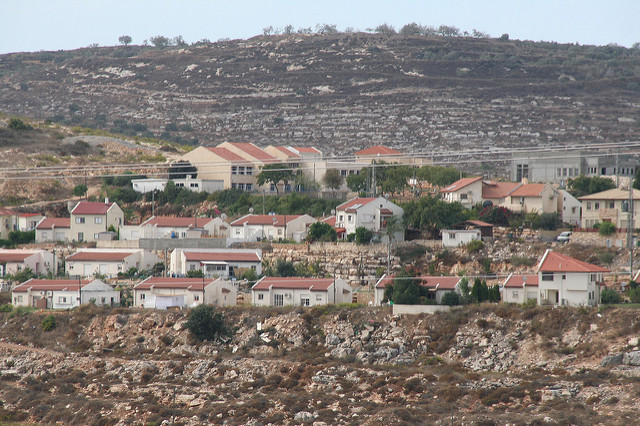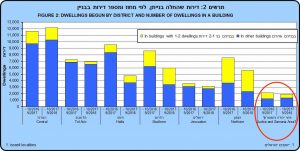FRESH AIR
Settlements growth decreases, but not in the eyes of Peace Now, AP
January 10, 2019 | Ahron Shapiro

On January 4, The Australian published a highly speculative and misleading AP article touting claims by the Israeli anti-settlement NGO Peace Now that inaccurately stated a substantial decrease in settlement housing construction was a substantial increase and conflated the advancement of settlement construction plans with actual construction.
In the story “Settlers make up for lost time after Obama” (Online, “Israeli settlement activity appears to surge in Trump era”),
AP’s bureau chief for Israel and the Palestinian territories Josef Federman wrote:
“The data compiled by Peace Now showed a drop in construction starts during Mr Trump’s first year in office, to 1643 units in 2017, from 3066 units the previous year. This drop appears to reflect the lingering effect of reduced planning during the final two years of the Obama administration. But the data for the first nine months of last year [2018] indicate the beginning of a Trump effect, with construction starts 20 per cent higher than the same period a year earlier.” [Emphasis added]
Federman’s fantastic claim is simply baseless. Official statistics show settlement housing starts over the period he cited were not up at all. In fact, they were actually down almost as much as he claimed they were up. As the Jerusalem Post’s Tovah Lazaroff reported on December 19 in an article titled “Settler housing starts drop 52% in third quarter of 2018”:
“Overall settler housing starts from January to September of this year [2018] were down by 17%, from 1,459 to 1,206, when compared to the first nine months of 2017.
Meanwhile, also on December 19 in an article titled “UN: Israeli Construction in West Bank Settlements at a Record Low”, Ha’aretz quoted UN Mideast envoy Nickolay Mladenov as saying that the latest settlement figures represent “the lowest number of quarterly advancements and approvals recorded since [anti-settlement UN Security Council Resolution 2334] was adopted [in December 2016].”
Unfortunately, the two factually-based stories on the downturn in settlement construction were not reported in Australia – but as we have seen, the January 4 AP story parroting Peace Now’s misleading spin did get picked up.
Settlement growth during the Trump era: The facts
If there has been a “Trump effect” on the ground, then, what has it been?
A graph produced by Israel’s Central Bureau of Statistics, also on December 19, tells the real story: Since October 2016 (and coming off a huge decline compared with the spike that occurred in President Barack Obama’s last year in office), settlement housing starts have been generally flat with a slight recent decline (relevant part of graph encircled in red).

Meanwhile, on January 9, the Jerusalem Post’s reporter Tovah Lazaroff reported that even in the context of population growth within the settlements – an oft-cited figure divorced from construction entirely and having more to do with natural growth – statistical indicators are now nearing an all-time low.
The growth rate in the settler population has slowed under Prime Minister Benjamin Netanyahu to its lowest point in over 23 years and possibly its lowest point ever, according to data from the Yesha Council and the Central Bureau of Statistics.
‘Laying the groundwork’?
So, if housing starts are down in 2018, what is the basis for Federman’s alarmist claims that Israel is “laying the groundwork for what could be the largest construction binge in years”? He relies heavily on Peace Now, which resorts to exaggerating the significance of other indicators that have increased since Trump was elected – things like the “advancement” and “planning” or “approvals” of construction projects in the settlements.
In fact, discussion of these indicators, and explaining why they are somehow more significant than the number of actual housing starts, accounts for a large portion of Federman’s nearly 700-word article.
Yes, “advancement” and “planning” or “approval” of settlement construction is a prerequisite for construction and “could” eventually lead to development, as Federman says. Historically, however, there has been no absolute correlation between such planning activity and actual construction, and many such plans never make it out of the planning stage.
In reality, a single project can, and historically has often, been advanced or approved many times over as a political ploy to appease pro-settler coalition parties without having to actually build anything. There can also be a variety of other factors – technical, logistical and otherwise – that can cause West Bank construction projects to fail to be acted upon (which can see approvals re-issued at a later date, and then counted again).
(To give one example, we can point to the memorable case of hundreds of housing units in the settlement of Beit El that were repeatedly announced and approved without follow-up action for at least five years.)
Peace Now chooses to focus on the issue of approvals because they need something to create anti-settlement headlines and anti-settlement pressure with, but to treat approvals with the same significance as actual construction is a distortion. Serious journalists should know better than to accept the group’s spin without looking at the wider context and reality.
Where are the houses?
Another factor to consider, entirely omitted from Federman’s January 4 article for AP, is which settlements are seeing actual construction in the form of housing starts (as opposed to mere advancements, plans or approvals).
The CBS’ statistics on housing starts do not provide fine detail of which specific towns actually saw construction take place. However Peace Now own research has consistently shown that the overwhelming majority of construction in West Bank settlements in recent years has been within the settlement blocs Israel is expected to keep in any peace agreement with the Palestinians through the use of land swaps.
The dovish NGO concedes that a two-state solution based upon previous Israeli offers to the Palestinians is still implementable vis-à-vis the settlements.
As such, the significance of such expansion on the prospects for peace is negligible.
I’ve discredited Peace Now’s deceptive reports on the settlement issue in several previous blogs. See here, and here for recent examples.
Tags: Israel, Palestinians
RELATED ARTICLES

US Middle East strategy amid regional instability: Dana Stroul at the Sydney Institute

Antisemitism in Australia after the Bondi Massacre: Arsen Ostrovsky at the Sydney Institute





















